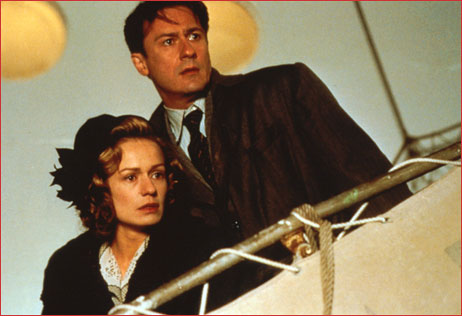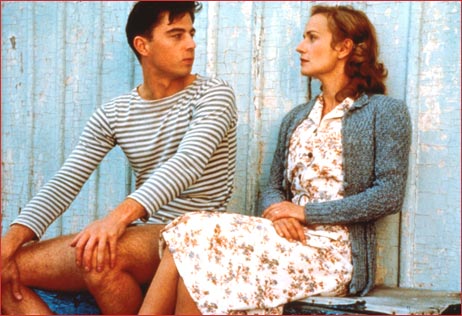East-West
(Est-Ouest)


At this year's Academy Awards, East-West was the movie favored to win the Academy Award for Best Foreign Language Film. It deals with love and loss, takes place over a period of years, and features a director and actors with excellent pedigrees. The epic scope behind East-West comes from the efforts by Russia after World War II to have its citizens return from abroad to help rebuild the country.
Alexei Golovine (Oleg Menchikov, The Barber of Siberia, Burnt by the Sun) answers Stalin's call, and decides to move his family from France to Russia. Alexei is a doctor, and Russia desperately needs his talents. Once in Russia, Alexei and his wife Marie (Sandrine Bonnaire, Indochine, The Color of Lies) realize the lie they are in. Diplomats immediately accuse Marie of being an imperialist spy and tear up her passport. There is no way for Alexei, Marie, and their young son to return to France. The Golovines now live in a small room in a house occupied by five other families. The owner of the house befriends Marie, and is subsequently accused of spying. Alexei and Marie take the woman's grandson Sascha (Sergei Bodrov Jr., The Brother, Prisoner of the Mountains) into their household.
Alexei and Marie both want to leave, but approach the solution differently. Alexei wants to work within the system. He feels that the best way to leave is to become a good Communist, and in time, the constant suspicion aimed at them will abate. Marie desires an immediate solution. She tells Alexei that Russia is killing her, and she tries at every opportunity to find a way to escape. Their differences begin to drive them apart. At a showing of Marie Tudor, the party forces Alexei to give a speech telling the French how happy he and his family are. The lie shocks Marie, who implores a French actress, Gabrielle, (Catherine Deneuve, The Letter, Time Regained) for help. The wedge between Alexei and Marie drives Alexei to the woman living across the hall and Marie to Sascha.
Sascha also wants to leave Russia. He is a talented swimmer, and hopes to make the Russian swim team and defect while out of the country. Marie becomes Sascha's coach, instilling a renewed sense of hope into him. She also slowly becomes a mother figure to Sascha, and later his lover. Unlike many movies that feel too long, East-West does not feel long enough. Without giving anything away, near the end of the movie, each time it feels like the movie is going to end, it goes on. And it is a good thing here. The story by Regis Warginier, Serguei Bodrov, Roustam Ibraguimbek, and Louis Gardel (Himalaya) includes much, but also leaves out much, especially at the end. This is necessary to make the movie watchable in one viewing. East-West becomes surprisingly tense at times, and heartbreaking at others.
Bonnaire is far and away the best thing about this movie. Warginier (A French Woman, Lumiere and Company) directs her beautifully as the emotional center of the film. Her thoughts and demeanor come out in her appearance and her eyes. When Marie arrives in France, she is confident and happy. As her experiences worsen, the life in her eyes begins to fade. Bonnaire's performance is reminiscent of Carole Bouquet's role as Lucie Aubrac. Both are strong women in extremely adverse situations, and both serve as the driving force behind their families. It is also interesting to note that Marie and Manuela (Cecilia Roth) of All About My Mother both rely on actresses to help them in their distress. In Marie's case, Gabrielle is the last link to her homeland, her only chance for escape. In the end, East-West lost out to Pedro Almodovar's equally good All About My Mother, but with its national release, viewers can finally compare the two and make up their own minds.